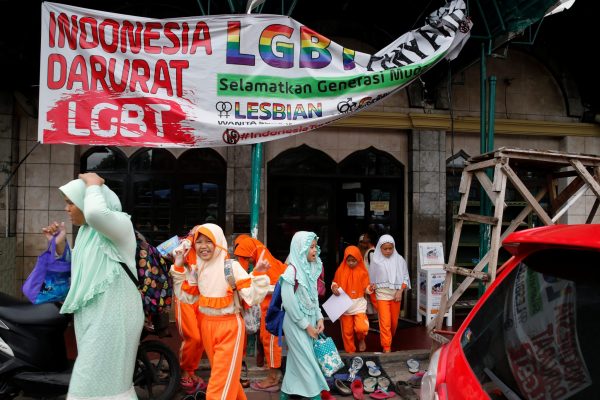While Aceh is unique in Indonesia in that it is the only province to criminalise same-sex relationships, public displays of anti-LGBT sentiment are becoming more common across the archipelago. There were several mass arrests of LGBT citizens in Jakarta last year, and there is continued debate about whether homosexuality should be criminalised despite such a proposal having been rejected by the Constitutional Court in December 2017. How should this growing visibility of anti-LGBT sentiment in Indonesia best be understood?
The answer is not clear-cut and involves a number of interacting factors.
First, there are increasing levels of Islamic piety throughout the country and greater attention is being paid to fundamentalist voices. A number of ulama (Islamic religious leaders) are calling for LGBT individuals to be forcibly re-educated and made to conform to heteronormative (male–female) models. In 2018, ulama are being accorded a public platform that was previously denied to them. In comparison to earlier periods, particularly the Suharto era of authoritarian rule, ulama now have incredible influence and authority in Indonesia, with people taking their sermons literally.
Second, Indonesia’s anti-LGBT sentiment ties into a more general moral panic around sexuality. Some proposed changes to the criminal code would penalise all sexual intercourse between unmarried people, regardless of their sexual orientation.
Third, political competition in the context of growing religious adherence is increasing anti-LGBT sentiment. Political rivals have figured out that they can increase their support base by being (or at least appearing to be) the most pure and pious of all candidates. Espousing hatred of LGBT people, or of anything that might go towards such things as supporting sexual and gender equality, is one way that politicians can promote this image.
Fourth, there is increasing inequality in Indonesia and whenever there is uncertainty people try to control things that they perceive as being in their ability to control. Sexuality and gender often fall under this category and LGBTs become scapegoats for the misfortunes of others.
Fifth, globalisation is impacting anti-LGBT sentiment. Media coverage of marriage equality in Indonesia’s near neighbours such as Taiwan, Australia and New Zealand is creating panic among conservatives in Indonesia. Even countries such as Singapore are subtly increasing tolerance of LGBTs. In a slightly different vein, media coverage of rising homophobia in South Korea is giving ammunition to the voices of hatred in Indonesia.
Sixth is the role and influence of domestic media. Media outlets in Indonesia do not just represent events but in some cases recreate them in misleading and potentially damaging ways. The LGBT ‘threat’ in Indonesia is being created in part by media coverage that frames being LGBT as a disease. Social media can also crystallise an angry mob with GPS accuracy via thousands of camera lenses, conjuring mass violence and hatred against LGBTs.
Seventh is the issue of space. There is a shrinking of public spaces in favour of private spaces in Indonesia. Locations where LGBTs could find a space to gather are now rare and overtly surveilled, and are seen as spaces in need of rehabilitation and modernisation.
What is needed in Indonesia is strong leadership that is willing to say more than simply ‘LGBT should be accepted’ (as Indonesian President Joko Widodo did) and to give weight to these words by taking action to end the persecution of LGBT.
There are several tools available to fight anti-LGBT sentiment.
The Indonesian government must ensure that the voices of Islam that promote anti-LGBT sentiment are being counterbalanced by those that stress the benevolence of Islam. This requires giving an equal platform to the voices that expound the view that God created humans just as they are meant to be and espoused love for all, and, as such, LGBT people should be accepted.
Indonesia could also adopt Singapore’s line that to attract world-class talent and to make Indonesia an economic powerhouse, Indonesia must support diversity. Global talent tends to want to live in gender and sexually diverse communities, and intolerant countries have great difficulty attracting these individuals.
Another step in combatting anti-LGBT sentiment is improving access to and the quality of sex and gender education. Often people say they ‘hate LGBT’ without having any idea what LGBT is. When LGBT is explained, homophobia and transphobia tend to decrease significantly.
As a more immediate solution, the Indonesian government should ban hate speech and hate acts. It should be unlawful for police to strip and shave transwomen, but Indonesian police act with impunity. There needs to be serious checks and balances in place that penalise hatred.
Indonesia’s motto is ‘unity in diversity’ — all citizens must not only be tolerated but be honoured and respected. While activists, academics and non-governmental organisations will continue their fight to support diversity, it is time for the government to take a firmer stand and ensure all Indonesians count.
Optimistically, the uptake in instances of anti-LGBT behaviour in Indonesia can be put down to the actions of a minority of people who are trying to see how far they can push the boundaries of democracy before they go too far. Criminalising sexuality and gender is too far.
Sharyn Graham Davies is Associate Professor at the School of Social Sciences and Public Policy, Auckland University of Technology.
Sharyn wishes to thank Saskia Wieringa, Hendri Yulius and especially Ben Hegarty for insightful comments.

